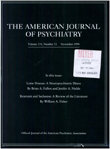Adrenergic receptor genes as candidate genes for panic disorder: a linkage study
Abstract
OBJECTIVE: Several lines of investigation suggest that the noradrenergic neurotransmitter system may be involved in the pathogenesis of panic disorder. Since a mutation in a gene coding for one of the adrenergic receptors could account for both the familial nature and autonomic dysfunction of panic disorder, the authors performed analyses of the linkage between panic disorder and five adrenergic receptor loci. METHOD: The subjects were 14 multiplex pedigrees with DSM-III panic disorder or agoraphobia with panic attacks. The loci tested were the alpha 1/beta 2 pair on chromosome 5q32-q34, the alpha 2/beta 1 pair on chromosome 10q24-q26, and a second alpha 2 locus on chromosome 4. Flanking loci were included in the analysis on chromosomes 5 and 10 to increase the informativeness of the adrenergic receptor loci. RESULTS: Lod scores less than -2.0 were found at all five receptor loci. CONCLUSIONS: These findings provide strong evidence against the possibility that genetic mutation at any of these loci is responsible for panic disorder in these pedigrees.
Access content
To read the fulltext, please use one of the options below to sign in or purchase access.- Personal login
- Institutional Login
- Sign in via OpenAthens
- Register for access
-
Please login/register if you wish to pair your device and check access availability.
Not a subscriber?
PsychiatryOnline subscription options offer access to the DSM-5 library, books, journals, CME, and patient resources. This all-in-one virtual library provides psychiatrists and mental health professionals with key resources for diagnosis, treatment, research, and professional development.
Need more help? PsychiatryOnline Customer Service may be reached by emailing [email protected] or by calling 800-368-5777 (in the U.S.) or 703-907-7322 (outside the U.S.).



